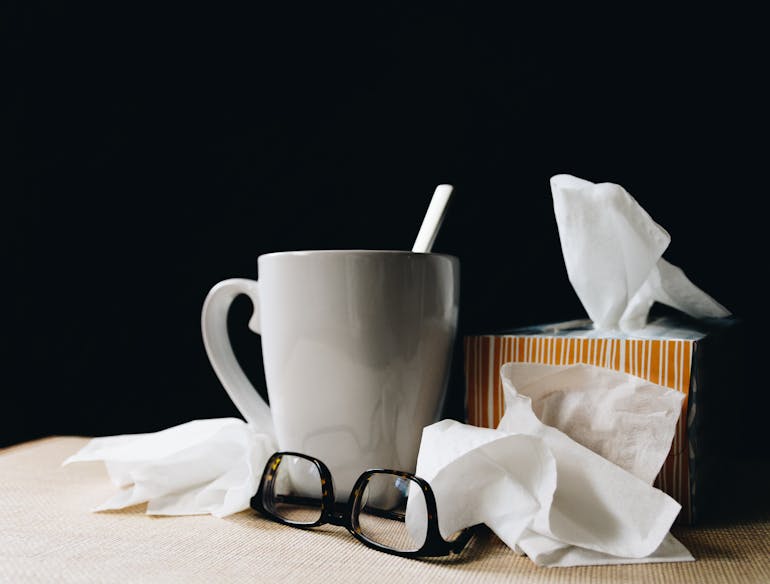Six steps to help the kids through a cold or flu this winter
Reviewed and fact-checked by Giulia Guerrini, Superintendent Pharmacist. Read our editorial policy to see how we create informative, accurate content.
It’s that time of year where we start to see a bit of a drop in temperatures. The transition into winter can cause changes related to health such as infections, common cold, and the winter flu.
During winters, children under 5 years of age are most affected explicitly with cold and flu due to their weak immunity and health, which makes them more susceptible to transitional effects of different seasons.
Common cold and flu are both viral diseases or infections, which mostly cannot be treated with the help of antibiotics. That’s why preventive measures and measures to ease any symptoms are required in these cases.
1. Extra Clothing:
- During the seasonal transition to winter, try to keep your child warm with additional layers of clothing. Try to make them wear masks while going outside because most of the time, air travel through the nasal passage and causes cold.
- Keeping your child warm will help in strengthening his/her immune system, which is an ability to fight different infections.
- If your child has already been infected with a viral infection, then layers of clothing might not help in contracting the virus but can help in improving the body’s response to infection.
2. Avoid unnecessary contact:
- Flu and the common cold are sometimes contagious, which means that they can spread from direct contact.
- In order to prevent the onset of these infections, and to prevent them from spreading to other children, try to avoid your child contacting any affected people.
- Consider using mouth and nose masks while going through these viral stages.

3. Maintain proper hygiene:
Maintaining proper hygiene is also vital in the prevention of infections.
- Ask your child to wash their hands frequently, before and after eating, after the use of the bathroom, after playing with pet animals, and after sneezing and coughing.
- Always try to keep a hand-gel or sanitiser (alcohol-based) with you while going outside when soaps and water are not easily available. Don’t use alcohol-based sanitisers for extended periods as they can also affect the flora of hands.
- Try to persuade your kids not to touch their mouth, nose, and eyes.
- Make sure that your kids play in a health-friendly and clean environment, most specifically when kids are playing with each other in a group.
4. Avoid dehydration:
- Fever caused as a result of viral infections can cause dehydration in children. Try to keep your kids hydrated during these infections to make them feel better and keep their immune system working hard. During the flu or cold, kids do not feel like drinking water and juices and are more uncomfortable while drinking; therefore, it is an important step to encourage them having plenty of fluids like water, warm soups, electrolyte solutions, and apple juice.
- In babies under three months of age, dehydration can be severe. Common signs of severe dehydration in babies include decreased body movements, crying without tears, less urination, dry mouth and lips, soft spots which might seem as sunken-in appearance.
- Encourage several short intake sessions during a day for consumption of enough fluid.

5. Treat nasal congestion:
- For the ease of nasal congestion, you can use saline nasal sprays. These sprays can be bought over-the-counter and have an excellent safety profile for children. These sprays are not the same as other medicated nasal decongestant sprays. For children, medicated sprays are not advised. There are several other methods to avoid nasal congestion and allow easy breathing in a child suffering from viral infections.
- For infants, you can use an aspirator for sucking the mucus from the baby’s nose. The best approach is to use nasal saline for loosening the built-up mucus.
- Please encourage your child to blow their nose regularly.
- In kids less than 4 years old, never use OTC medicines for treating cough or cold.
- You can use a cool-mist humidifier in the room of your child, which will help in breaking the mucus build. While using this humidifier, you would have to keep it clean regularly to prevent any mould build up inside the machine itself.
6. Encourage rest:
- During infections, the body tries to fight the disease with all its strength; that’s why you can feel fatigued and lethargic during cold, fever, and flu.
- Encourage your child to take rest for avoiding the extra workload on body mechanisms. Prolonged rest during infections can help in faster recovery.
- Dress your child comfortably and according to his/her body temperature.
- If a child is shivering, make sure to cover him/her in extra clothing, but if a child feels hot due to fever, then loosen up the clothing.
- Bath with lukewarm water before going to sleep at night or taking a nap can also help in combating the lethargy and restlessness as it can induce a relaxational effect.
- In case of increased temperature and worsened conditions, immediately refer to any health care professional.
Have any tips yourself? Get in touch with us on Twitter or Facebook and share using the hashtag #medinotips.
Facebook: @wearemedino
Twitter: @wearemedino

